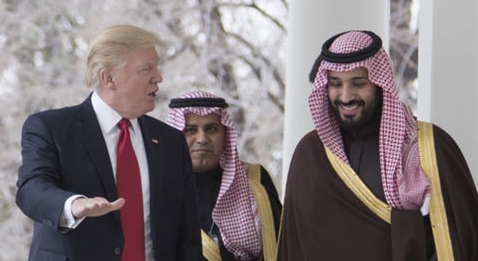 Much of the Iranian opposition abroad is thrilled with anticipation these days.
Much of the Iranian opposition abroad is thrilled with anticipation these days.
It is looking forward to the resumption of US secondary sanctions against Iran’s oil industry and Central Bank on November 5, and the hard blow the Iranian economy is expected to take as a result. The opposition, along with some key members of the Trump administration, appears to hope that the economic pressure will prompt nationwide street protests and ultimately lead to the overthrow of the Islamic Republic and its replacement by a more democratic, secular government.
A number of prominent dissidents in the so-called “subversion” (Barandazi) movement wrote a letter in December 2016 to then President-elect Donald Trump, encouraging his administration to scrap the multilateral Iran nuclear deal known as the Joint Comprehensive Plan of Action (JCPOA) and re-impose crippling sanctions against Tehran.
“We ask the incoming administration to develop a comprehensive regime of sanctions against those Iranian officials who have violated the human rights of the Iranian people over the last four decades,” they wrote.
However, the focus on human rights shows why the Trump administration may be a bad bet for the Iranian opposition.
Apart from nuanced and well-grounded arguments about the collateral damage and humanitarian cost of economic sanctions, Trump’s “transactional” profit-centered approach to international relations does not bode well for the democratic aspirations of anti-regime Iranians.
“America First,” the guiding principle of Trump’s foreign policy, seems to be primarily based on maximizing US material interests in a zero-sum environment where factors such as human rights are secondary to economic gain. In Trump’s mindset, material interests—or “winning” as he likes to put it—take precedence over normative values, even if aggressive pursuit of the former at the expense of the latter might have undesirable consequences for America’s image in the world. The US withdrawal from the Paris climate agreement despite widespread international criticism was perhaps the starkest manifestation of this worldview.
Another cautionary note for Iranians who stress the importance of human rights is manifested by the Trump administration’s North Korea policy.
Trump met North Korean leader Kim Jong-un in a historic summit in June and reached a vague agreement with him on denuclearization of the Korean Peninsula. So far, apart from a moratorium on nuclear and missile tests, North Korea has yet to reveal or remove a single nuclear weapon. Regardless of how realistic the accord was and how little progress Washington and Pyongyang have made towards implementing it, human rights and any democratic aspirations of the North Korean people were conspicuous by their absence. Indeed, Trump has called Kim—who presides over concentration camps and ordered the brutal execution of his uncle and half-brother—a “very honorable” man. The Trump administration did secure the release of three American citizens in the run up to the Singapore summit, but hasn’t had much to say about the appalling living conditions of Koreans under Kim’s rule.
The administration’s Syria strategy reflects a similar prioritization. According to James Jeffrey, the State Department’s Special Representative for Syria Engagement, Washington no longer adheres to the “Assad must go” policy. Syrian President Bashar al-Assad “has no future, but it’s not our job to get rid of him,” Jeffrey said in early September. This is clearly a great disappointment for members of the Syrian opposition still bent on removing Assad from power.
Most recently, the transactional approach manifested itself in Washington’s handling of the brutal murder of Saudi journalist Jamal Khashoggi. While Trump criticized Riyadh for the murder and even threatened “severe consequences” for those behind the crime, his administration seems more concerned about the large-scale arms trade and strategic ties between the two allies than respect for human rights. “I don’t like stopping massive amounts of money that’s being poured into our country,” Trump said, adding that the Saudis “are spending $110 billion on military equipment and on things that create jobs for this country.”
A similar scenario, in which norms and values are lower down the political agenda than other perceived interests, may very well happen in the context of US-Iran relations. Despite frequent comments by Secretary of State Mike Pompeo highlighting Iranian human rights abuses and seemingly adding human rights to US prerequisites for negotiations, Trump at the United Nations in September described Iranian President Hassan Rouhani as “an absolutely lovely man” and expressed a willingness to meet Iranian leaders “anytime they want.” “It’s good for the country, good for them, good for us, and good for the world. No preconditions. If they want to meet, I’ll meet,” he said during a July press conference at the White House.
Yet this is the same politician who as one of his first acts as president banned most Iranians from traveling to the United States and who during the campaign called Iranians a “terrorist nation.” One of Trump’s biggest supporters in Congress, Senator Lindsey Graham of South Carolina, pronounced on live television recently that he hoped he had no Iranian blood in his DNA.
With respect to Iran, Trump’s “America First” stance could translate into one of two scenarios: a Singapore-style “deal” that constrains Iran’s nuclear and missile programs but overlooks Tehran’s human rights violations; or a “maximum pressure” campaign that fights the Islamic Republic to the last Iranian.
Neither scenario would fulfill the aspirations of the Iranian opposition for a new regime that fulfills the democratic hopes of many Iranians inside and outside the country.
Maysam Behravesh is a multimedia journalist at the TV channel, Iran International and a PhD candidate in the Department of Political Science at Lund University in Sweden. Follow him on Twitter: @behmash.
Image: US President Donald Trump walks with the Saudi Arabia’s Deputy Crown Prince Mohammed bin Salman outside the Oval Office of the White House (Official White House Photo by Shealah Craighead)
